-Rosy Singh, Resource Center Manager, ENPHO)
Context
Nepal has been declared as Open Defecation Free (ODF) nation and is now moving ahead for the attainment of Total Sanitation. Amongst other issues of the sanitation, the proper management of fecal sludge, specifically in urban and peri-urban areas of Nepal is becoming a pressing issue to be resolved. Gradually, the Fecal Sludge Management (FSM) is gaining prominence in national government agenda. However, in order to meet the SDG 6.2 targets set by Nepal, the initiatives on FSM still need to be accelerated with equal participation and effort from all levels and stakeholders of the nation including government, national and International agencies, institutions and the private sectors.
Whilst the prompt actions are required on FSM, many challenges lie at the forefront. One of the major challenges identified on implementation of FSM initiatives is the lack of capacitated human resources across the entire sanitation value chain which comprises containment, desludging/transportation, treatment and reuse/safe disposal of the fecal sludge.

The Department of Water Supply and Sewerage Management (DWSSM) in the Ministry of Water Supply recognized the insufficient capacity to design non-networked sanitation systems in urban areas and work for fecal sludge management. In addition to this, the Government of Nepal (GoN) also identified the need for the training on good practices and principles of FSM and Fecal Sludge Treatment Plant (FSTP) design as the first step in building a practical knowledge base to improve capabilities. On this basis, DWSSM requested the support of the United States Agency for International Development (USAID) Water, Sanitation and Hygiene Finance (WASH-FIN) Project to improve the capacity of government engineers to design FSM related infrastructure and systems for urban areas to ensure future allocated budgets are expended to deliver reliable and sustainable sanitation services.
In this context, USAID WASH-FIN Nepal, with the technical support of Environment and Public Health Organization (ENPHO) and Consortium for DEWATS Dissemination Society (CDD, Society), India developed training curriculum on FSM to build foundational capacities of the targeted participants and fill capacity gaps on proper FSM and in the design of viable FSTPs in Nepal. The curriculum comprises of 7 modules as mentioned below:
Module 1: Orientation to fecal sludge management
Module 2: Fecal sludge treatment technologies and system design
Module 3: Operation and maintenance of fecal sludge treatment plant
Module 4: Planning of fecal sludge management
Module 5: Business models and financing for fecal sludge management
Module 6: Institutional, legal and regulatory frameworks for FSM
Module 7: Resource recovery and safe reuse of treated fecal sludge
The curriculum and materials will serve as training resources for the National Water Supply and Sanitation Training Center (NWSSTC) which will take the training forward. The curriculum consists of a suite of education materials primarily targeting public sector engineers (PSEs), decision-making government officials, private sector actors and will have value to all other sector professionals.
Brief Overview of the Training Modules
Lack of or limited knowledge on FSM amongst the stakeholders is one of the major challenges in the sector. To overcome this problem, Module 1 intends to provide a fundamental understanding on core concepts of technical solutions and challenges of FSM and sensitize the target audience on FSM and its importance. Actually, this module summarizes all the modules and is expected to fulfil the need of sensitizing and creating demands from the relevant stakeholders. Fecal sludge treatment is an important component of FSM. Hence, Module 2 would help in making the right choice of technology for treatment of fecal sludge for a given context, provide knowledge of designing fecal sludge treatment technologies in the most efficient way and help in understanding the costing of treatment infrastructure and operation and maintenance requirements. Module 3 covers important aspects of FSTP operation and maintenance activities, provides understanding on health and safety aspects to be followed during operations and the significance of better enforcement of municipal regulations and compliance to the pollution norms. Likewise, Module 4 focuses on planning of fecal sludge management to enhance knowledge and understanding on the need for integrated planning approach and evidence based planning. Module 5 aims to provide a basic understanding of the economics of FSM business and help in knowing various business models tried out so far and their key success factors. Nepal has significant gap in resources and enabling environment on FSM in order to take significant leap on safely managed sanitation. In this context Module 6 aims to develop a comprehensive understanding on the existing policy, regulation and institutional arrangements and provide an enabling environment for programming future FSM initiatives. Finally, Module 7 aims to understand the potential of resource recovery (nutrients, energy, etc.) from FS for sustainable sanitation service delivery, understand required technical, financial and institutional aspects of resource recovery from FS, understand required safety measures to mitigate risks associated with the use of treated FS in agriculture and understand the best practices for co-composting of fecal sludge and municipal organic solid waste management.
Training on FSM and FSTP Design to Public Sector Engineers
Based on the aforementioned curriculum modules, NWSSTC and USAID WASH-FIN Project, Nepal, with the support of ENPHO and CDD Society, India organized ‘Fecal Sludge Management/Fecal Sludge Treatment Plant Design Training’ from 8 to 21 February, 2021 from 3 to 7 pm. Considering the safety measures for COVID-19, the training was organized virtually through Zoom platform. The major objectives of the training were to support in advancement of FSM, FSTP design and service delivery, build capacity of the public sector engineers for proper FSM and designing and constructing viable FSTPs and develop FSM and FSTP experts and master trainers. The training also intended to accumulate feedback and inputs from the participants so as to incorporate them in revising and finalizing the training contents and materials before they are handed over to NWSSTC. Altogether, 20 engineers working in public sector attended the training. They were from Banke, Bara, Bhojpur, Dhanusha, Jumla, Kailali, Kaski, Kathmandu, Khotang, Lamjung, Makwanpur, Morang, Ramechhap, Rupandehi, Susari and Surkhet districts of Nepal.
The training kicked-off with an inaugural session on 8 February 2021 which was chaired by Ms. Meena Shrestha (Director General, DWSSM). Mr. Madhav Belbase (Secretary, Ministry of Water Supply) graced the session as the chief guest. Likewise, Ms. Patricia Mengech (Office Director of Health Office, USAID Nepal), Mr. Sunil Kumar Das (Joint Secretary, Ministry of Water Supply), Mr. Anil Bhadra Khanal (Deputy Director General, DWSSM), Mr. Surya Raj Kadel (Deputy Director General, DWSSM), Ms. Pragya Shrestha (Activity Manager, WASH-FIN-USAID Nepal) and Ms. Bhawana Sharma (Executive Director, ENPHO) were the special guests for the session. Ms. Manima Budhathoki from USAID WASH-FIN Nepal moderated the opening session of the training.

Inauguration of e-banner of the training by the chief guest for the program Mr. Madhav Belbase
Special Remarks from Dignitaries
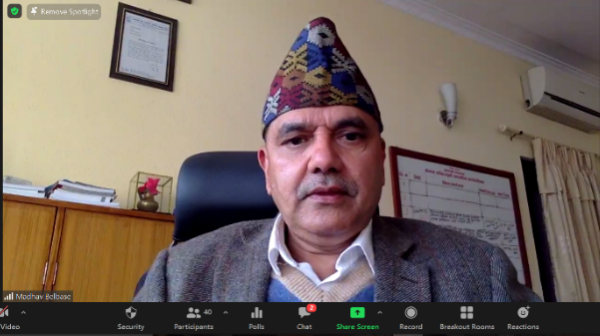
“Thank you so much to the organizers for this opportunity. This MTOT is going to be a major milestone on FSM for all of us. I am extremely delighted that my concern has been taken into consideration and converted into action by the department (DWSSM) and USAID WASH-FIN. I request all the participants to draw maximum knowledge and skill from the trainers and training. I wish all the best for this training.”
– Mr. Madhav Belbase (Secretary, Ministry of Water Supply)
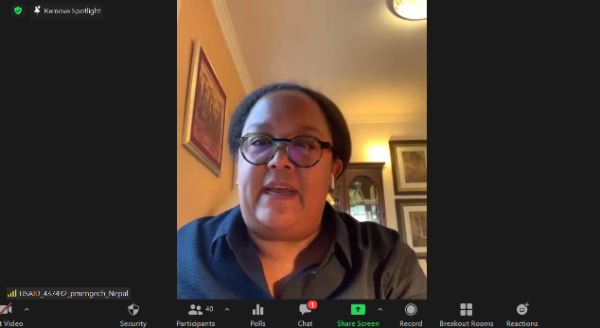
“It is my immense pleasure to attend this virtual training. Proud to say that Nepal has made tremendous achievement on attaining ODF. This has significantly increased number of toilets and on-site sanitation systems. Unfortunately, the fecal sludge are being disposed into the environment without or minimal treatment and polluting the environment. In this context, USAID is happy to support this program and facilitate this MTOT which further needs to be rolled out at every local government level. On behalf of USAID, I would like to thank CDD Society, India, ENPHO and WASH-FIN team for the development of training curriculum on FSM. USAID is committed to provide all necessary support and extends best wishes for the training.”
– Ms. Patricia Mengech (Office Director of Health Office, USAID Nepal)
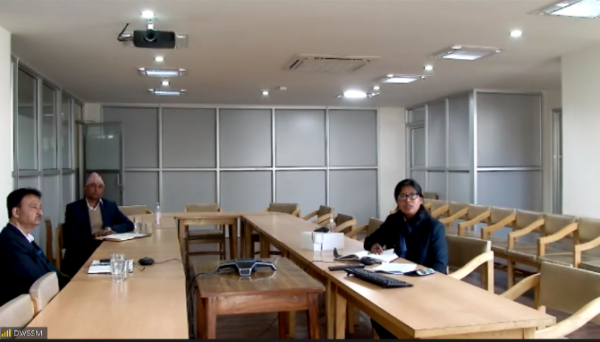
“As we all know, after the declaration of ODF nation, Nepal is now moving towards total sanitation. However, the nation lacks capacitated and trained human resource on FSM. In this context, I would like to thank USAID and WASH-FIN for the development of such a crucial training curriculum and conducting MTOT on FSM and FSTP. Also, I would like to thank ENPHO and CDD Society, India for developing the curriculum. I furthermore request all the participants to disseminate the knowledge gained through the training so that we will be able to develop many trained human resources on FSM and FSTP.”
–Ms. Meena Shrestha (Director General, DWSSM)
“We are delighted and thankful to USAID WASH-FIN for driving the task of capacitating human resource on FSM as envisioned by Secretary of MoWS Mr. Madhav Belbase and as discussed with DWSSM team. We would like to thank entire team of USAID WASH-FIN, ENPHO and CDD Society, India for this effort and also commit to provide continuity to the training.”
–Mr. Anil Bhadra Khanal (Deputy Director General, DWSSM)
“This training will add a greater value to FSM by developing master trainers capitalizing the knowledge of national and international trainers. We hope for further applicability, knowledge transfer and sustainability of the project and the training. I wish for the successful completion of the training and success of more FSM projects in coming days.”
-Mr. Surya Raj Kadel (Deputy Director General, DWSSM)
“The dearth of trained human resources is one of the major challenges for meeting SDG 6.2. This training package and training on FSM is expected to fulfill this gap and considerably support in meeting SDG target 6.2. We, entire ENPHO team is thankful for giving us this opportunity to contribute in this initiative. I wish for the grand success of the training.”
–Ms. Bhawana Sharma (Executive Director, ENPHO)

“FSM is a growing issue. To address this issue effectively and fulfill the capacity gap, ENPHO and CDD Society, India with the support of WASH-FIN, DWSSM and NWSSTC have developed training curriculum on FSM. We believe to develop FSM experts and trainers through this training and further roll out the training throughout the nation.”
-Mr. Ganga Datta Nepal (Country Team Leader, USAID WASH-FIN Nepal)
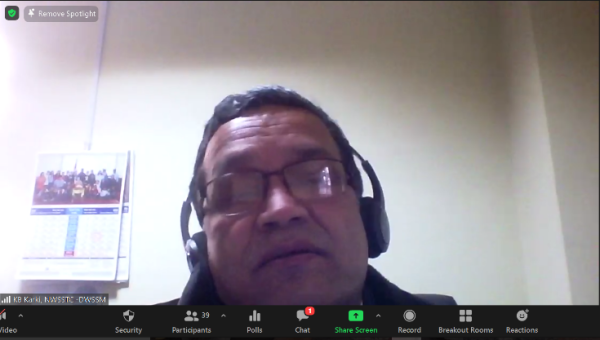
“On behalf of NWSSTC, I would like to welcome you all to this virtual training on FSM and express gratitude to all for your valuable presence and participation. As Nepal is declared as open defecation free nation, all the planners, designers, engineers along with NWSSTC should now focus on the importance of FSM and speed up the development in the sector.”
– Mr. Kabindra Bikram Karki (Director, NWSSTC)
Resource Persons and Facilitator
Training Center Manager of ENPHO Mr. Ashkumar Khaitu facilitated the 14-day training. Mr. Sunil Kumar Das, Mr. Kabindra Bikram Karki, Mr. Sanjaya Adhikary, Mr. Bipin Dangol, Mr. Prajwal Shrestha and Mr. Rajendra Shrestha from Nepal and Ms. Sandhya Haribal, Mr. Anantha Moorthy, Mr. Ritesh Suman, Mr. Kartik Kamath, Mr. Santosh G.S. and Mr. Nikhil Gampa from CDD Society, India were the resource persons for the training.
Voices from Participants
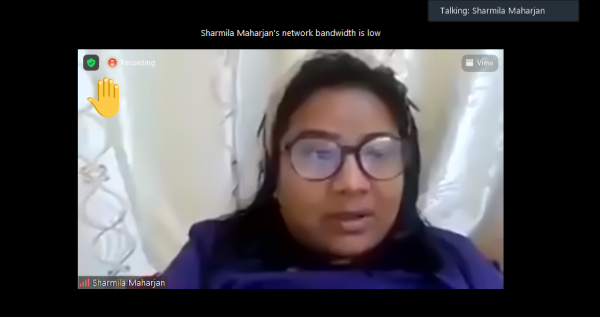
“Personally for me, the training has been very fruitful whereby I could learn a lot on FSM. I learned on taking FSM as business model, long-term benefits of FSM, reuse of fecal sludge, FSM implemenation on ground and many more. I am very thankful to ENPHO and CDD Society, India team, National Water Supply and Sanitation Training Center, USAID and entire WASH-FIN team for providing me this opportunity to learn about FSM.”
-Ms. Sharmila Maharjan
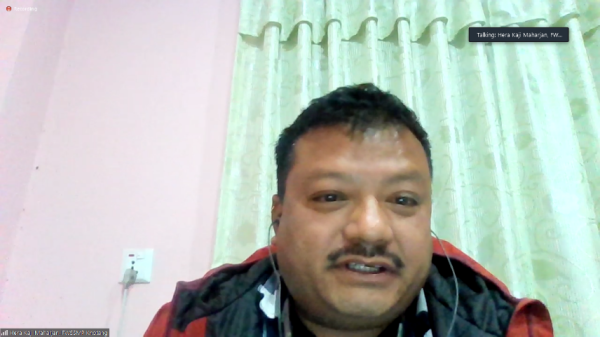
“This training has provided me an in-depth knowledge on FSM and FSTP design. I am now confident to work on FSM projects and discuss with the consultants in regard to FSM issues and the technologies. I would like to thank entire team of ENPHO, CDD Society, India, DWSSM, NWSSTC and USAID for this wonderful training.”
-Mr. Hera Kaji Maharjan
Conclusion
Thus, the 14-day virtual training on FSM and FSTP design was provided successfully to the initially targeted public sector engineers responsible for the planning, design, implementation and operation and maintenance of fecal sludge treatment systems, infrastructure and services. The participants had been identified by DWSSM and NWSSTC. Further to conducting the training effectively, feedback and suggestions from the participants were also collected. Thus, accumulated feedback will now be further utilized in revising and finalizing the training curriculum which will then be handed over to NWSSTC for rolling-out the training across the nation.





